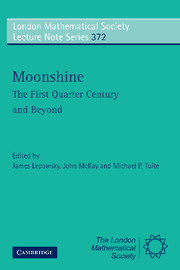 Moonshine - The First Quarter Century and Beyond
Moonshine - The First Quarter Century and Beyond Book contents
- Frontmatter
- Contents
- Preface
- Schedule of Talks
- Characters of Crossed Modules and Premodular Categories
- On the Injectivity of the Kudla-Millson Lift and Surjectivity of the Borcherds Lift
- Ordered Spanning Sets for Vertex Operator Algebras and their Modules
- Friendly Giant Meets Pointlike Instantons? On a New Conjecture by John McKay
- Modularity of Trace Functions in Orbifold Theory for ℤ-Graded Vertex Operator Superalgebras
- Twisted Modules for Vertex Operator Algebras
- Vertex Operators and Sporadic Groups
- The Algebraic Meaning of Being a Hauptmodul
- Borcherds' Proof of the Conway-Norton Conjecture
- On the Connection of Certain Lie Algebras with Vertex Algebras
- Vertex Operators and Arithmetic: How a Single Photon Illuminates Number Theory
- Rational Vertex Operator Algebras and their Orbifolds
- Quasi-finite Algebras Graded by Hamiltonian and Vertex Operator Algebras
- On Certain Automorphic Forms Associated to Rational Vertex Operator Algebras
- Moonshine and Group Cohomology
- Monstrous and Generalized Moonshine and Permutation Orbifolds
- New computations in the Monster
Rational Vertex Operator Algebras and their Orbifolds
Published online by Cambridge University Press: 06 July 2010
- Frontmatter
- Contents
- Preface
- Schedule of Talks
- Characters of Crossed Modules and Premodular Categories
- On the Injectivity of the Kudla-Millson Lift and Surjectivity of the Borcherds Lift
- Ordered Spanning Sets for Vertex Operator Algebras and their Modules
- Friendly Giant Meets Pointlike Instantons? On a New Conjecture by John McKay
- Modularity of Trace Functions in Orbifold Theory for ℤ-Graded Vertex Operator Superalgebras
- Twisted Modules for Vertex Operator Algebras
- Vertex Operators and Sporadic Groups
- The Algebraic Meaning of Being a Hauptmodul
- Borcherds' Proof of the Conway-Norton Conjecture
- On the Connection of Certain Lie Algebras with Vertex Algebras
- Vertex Operators and Arithmetic: How a Single Photon Illuminates Number Theory
- Rational Vertex Operator Algebras and their Orbifolds
- Quasi-finite Algebras Graded by Hamiltonian and Vertex Operator Algebras
- On Certain Automorphic Forms Associated to Rational Vertex Operator Algebras
- Moonshine and Group Cohomology
- Monstrous and Generalized Moonshine and Permutation Orbifolds
- New computations in the Monster
Summary
Introduction
The Conway-Norton conjectures about the Monster-modular connection, later established by Borcherds [B] following the work of Frenkel-Lepowsky-Meurman [FLM], set the stage for an intensive study of the origins of the relations between finite groups and modular functions. Norton also introduced generalized moonshine which associates q-expansions to pairs of commuting elements in M. His conjecture that the nonconstant functions that one obtains in this way are also hauptmoduln remains open.
By now it is clear that the principal mathematical idea underlying the general study of such phenomena is that of a vertex operator algebra. For an extensive class of vertex operator algebras, so-called rational orbifold models, one expects a theory completely parallel to Monstrous Moonshine whereby one associates modular functions to automorphisms of finite order. Furthermore, this theory naturally accommodates generalized moonshine. From this perspective, the Conway-Norton phenomena would be a particularly interesting spradic example of a general theory, just as the Monster itself is a particularly interesting sporadic example of a finite simple group.
In the spirit of the Edinburgh Conference, this paper is mainly devoted to a review of some of the main results currently available concerning the structure of rational vertex operator algebras and their orbifolds. We sometimes use the Frenkel-Lepowsky-Meurman Moonshine Module V♭ [FLM] to illustrate the ideas. We also suggest open problems - many of them well-known - whose solution would contribute to a more complete theory.
- Type
- Chapter
- Information
- Moonshine - The First Quarter Century and BeyondProceedings of a Workshop on the Moonshine Conjectures and Vertex Algebras, pp. 270 - 281Publisher: Cambridge University PressPrint publication year: 2010
- 1
- Cited by
